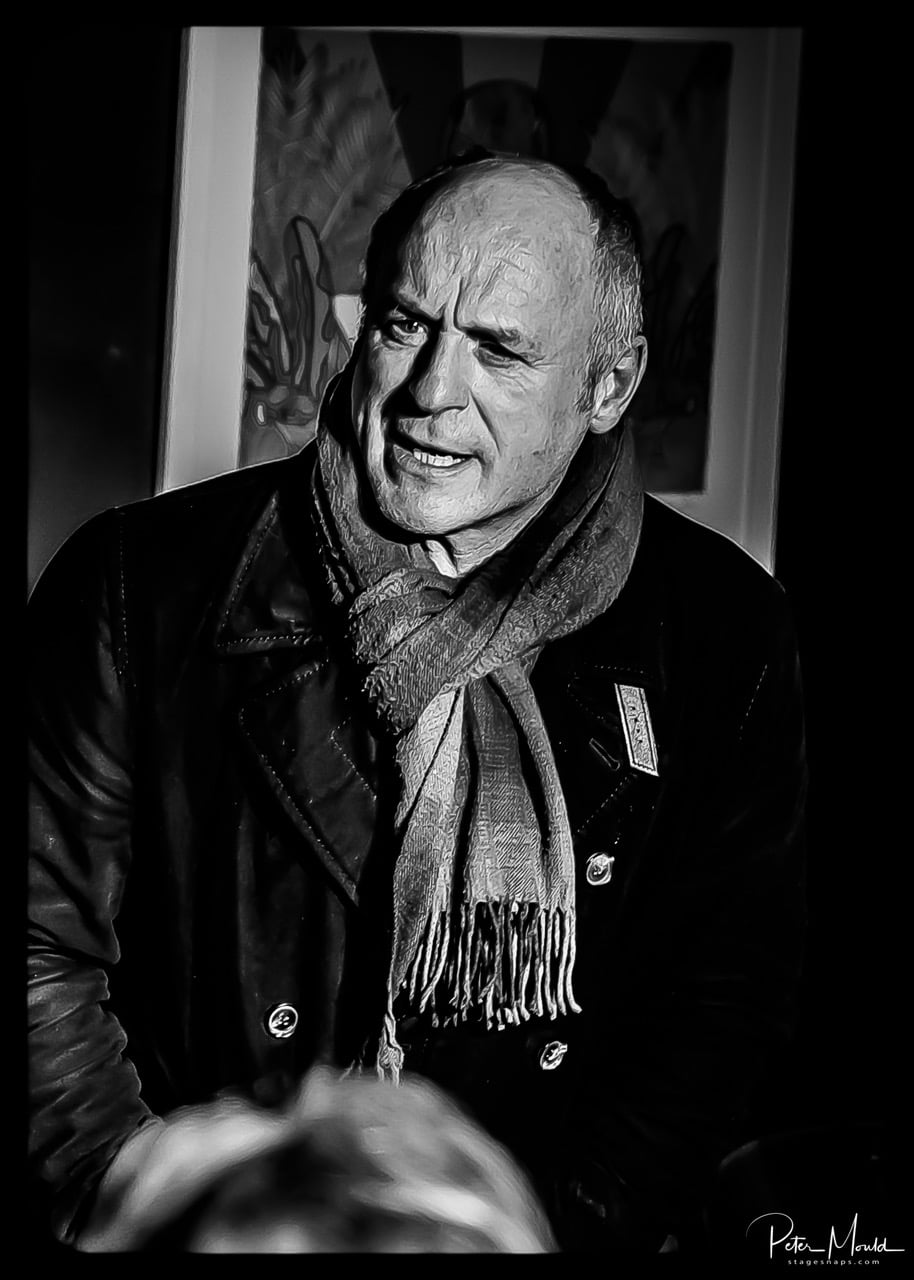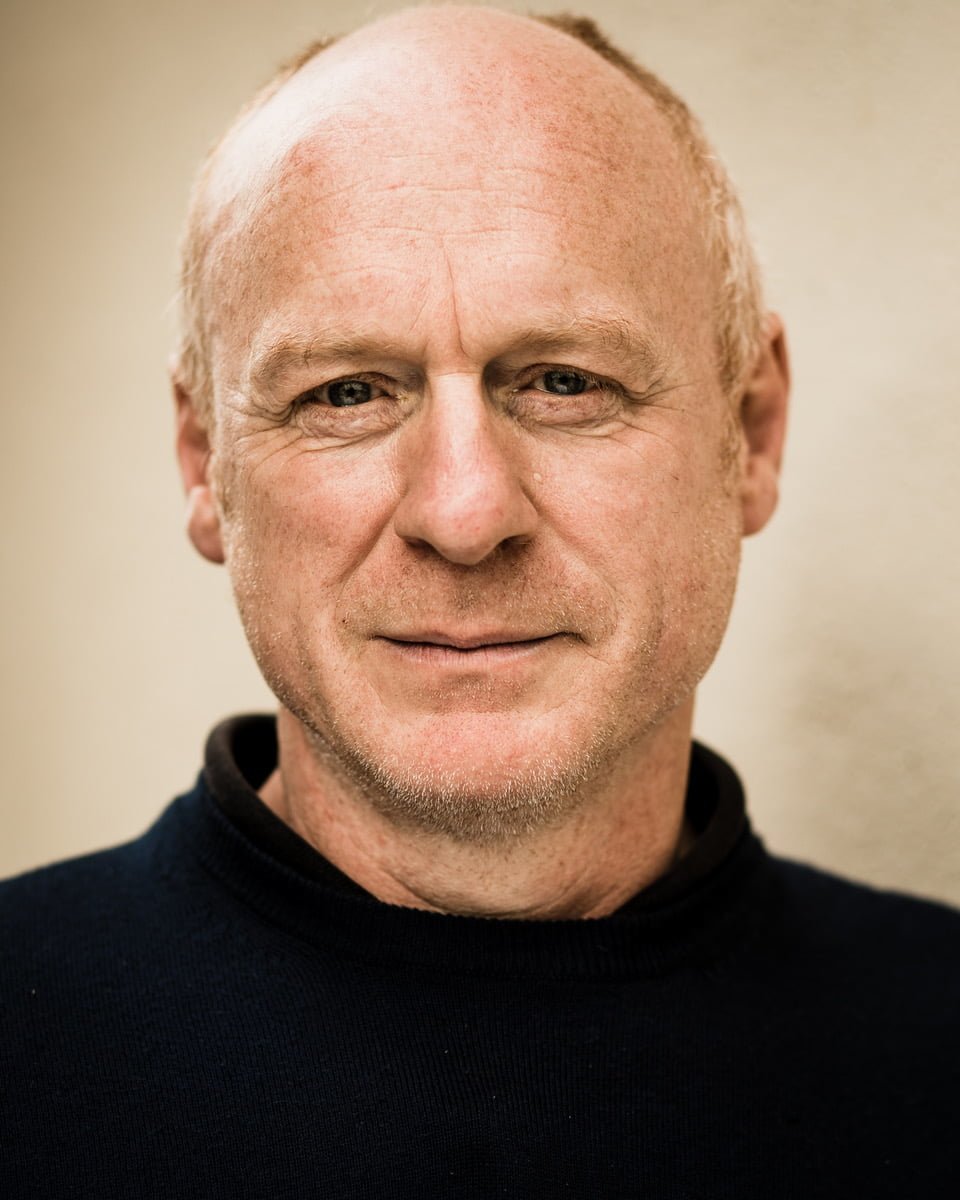Jonny Magnanti, a Leeds born actor, will be interpreting Tony Harrison’s still controversial poem V at The Carriageworks on Friday 8th March.
The Bloodaxe Books edition of V captures that controversy. On the cover is a photograph of tilted and broken headstones silhouetted amid snow in Holbeck Cemetery; the colossal beam of the floodlights of Elland Road provide light, but not enough to read the inscriptions. Inside are 26 pages of poetry, then 40 pages of clippings about the decision to broadcast a film of V on Channel 4 in 1987, c-word and all, from ‘Four Letter TV Poem Fury’ on the front of the Daily Mail, to the Parliamentary motion trying to ban the broadcast that grudgingly allowed “that the poem may not be wholly devoid of literary merit”, to a transcript of calls made to Channel 4 on the night of the broadcast, including one woman representing the disappointment of an entire village in Dorset, and a large number of people ringing to praise the film.
That furore is history now, but the cemetery is still with us, as are the themes of the poem. In this production Jonny Magnanti takes the audience into the municipal graveyard, daubed with swastikas and profanity and littered with discarded cans of Harp larger, using soundscape echoes of the period to place the lack of hope for the working class skinhead at the centre of the poem’s internal dialogue, both Tony and Jonny, confronting displacement and alienation from class and family roots. Magnanti brings V down to a simple story of who we are and what our individual legacies will be.
For The State of The Arts, Jack Simpson asked Jonny via email about the significance of V to him and to Leeds; how he, as an actor who left Leeds for London around the time V was written, feels about the question of class in Tony Harrison’s work; and his life in theatre now.
■

As a person from Leeds V is very significant for me. It’s about ‘us’ and our city. How the city shapes us. I am familiar with the references, the places and the landmarks.
It’s important for me because it explores the relationships with our parents, breaking the mould, sensing that there is something better for yourself, not wanting the same things that your parents thought was the norm. Why is not ‘for the likes of us?!’ It’s about love, and how we can’t control the passing of time and the changes that brings. Changing landmarks, expectations, aspirations, immigration… everything.
Also it’s really significant and important that it is told as a poem in verse. There is a lovely simple quality to it that belies the skill that’s gone into the construction of it. The language is instantly accessible which in turn makes V so powerful, direct and very visual. You are with him in that graveyard in Beeston, you see what he sees, you feel the same emotions he is feeling. You are spending the day with Tony Harrison. This really strikes a chord with a live audience.
There is a wit and a rhythm to the words. It’s a joy to recite! For me it’s up there with Chaucer, Shakespeare, Coleridge, any of the major poets.
Most important and significant of all however it belongs to Leeds. It’s written with a strong Leeds voice and accent. It is OURS!
I’m at an age now where I think a lot about the class struggles in Harrison’s work. Is it class or is it confidence and self esteem? The challenge is to take the class out of it.
If you are good at something or find something you love then by all means pursue it as best you can regardless of your class. Tony Harrison’s calling was poetry — Greek and Latin. He got a scholarship to Leeds Grammar and went on to university. Had he been brought up as a middle-upper class Eton educated boy nobody would have given this progression a second thought, but he was the son of a baker brought up in Beeston. I think this is what he tackles in V. Without that thirst for knowledge he would have been that skinhead in the cemetery. Has he betrayed his working class roots, is he an imposter? Should he have ‘Known his place?’
Is leaving your working class environment a betrayal? Do the people you grew up with feel you have left them behind or are no longer good enough for you? It’s a well explored theme.
I empathise with the class struggles in Harrison’s work. It’s why his work hits home to me and so many others.
I have nothing but happy memories of growing up in Leeds. Lots of mates, lots of sport, playing out and that. I come back a lot. My mum still lives in Headingley so I’m up and down all the time. I love Leeds and have tried to come back and live here but just couldn’t make it work. Most of the meetings for acting work are in London and I’ve carved a bit of a niche for myself in the voice-over world which is pretty much all London based. When I left Leeds in 1984 it was a little down on its luck as a city but it’s different now, it’s a vibrant cosmopolitan place and I love it. I’m hoping my daughter chooses Leeds uni.
My family and friends understood my desire to work in the arts, definitely. My parents were very supportive. Nobody in my family was into the arts at all. My parents knew I had my heart set on it, as did my mates.
I was drawn to the theatre by an inspirational teacher at school. Peter Gilbert was a Shakespeare nut. He abridged Shakespeare plays and put them on. When I started comprehensive school (St Mary’s in Menston) I saw one of Peter’s productions and knew immediately that I wanted to be involved. My first play was A Winter’s Tale. The minute I stepped on stage it felt like a magic world, a feeling I still get to this day.

I’ve done TV, film and adverts but the special memories are always the theatre jobs. I did a David Storey play in the West End called The Changing Room. David was a novelist, playwright, artist and ex-rugby league pro who played for Leeds RL (now the Rhinos). The Changing Room takes you through a game in Yorkshire on a freezing cold day, from the players turning up to when they left for the evening. A wonderful, powerful ensemble piece, and very northern.
Recently I worked at the National with the late great director Howard Davies. For an actor, working at the National is the equivalent for a footballer of playing for Barcelona. Throw in an amazing play and one of the best stage directors ever and you’ve got an unforgettable experience.
I can no longer wait for the agent’s phone to ring. I live now in a very creative town and have started directing and putting on projects that I really like and believe in. John Godber’s April in Paris was a brilliant, witty play, and now V. And yes, I’m aware there is a very northern theme occurring here.
■
Jonny Magnanti is performing V as part of Leeds Lit Fest at the Carriageworks Theatre on Friday 8th March at 9pm; the show is 40 minutes long and will be followed by a panel discussion and Q&A chaired by the Yorkshire Post’s culture correspondent Yvette Huddleston with performer Jonny Magnanti, author and journalist Anthony Clavane and Professor John Whale, Director of the University of Leeds Poetry Centre. Book your ticket here.
Filed under: Written & Spoken Word

Comments